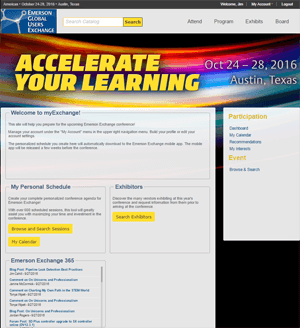The list of workshops, short course, plenary sessions, exhibits and more at the October 24-28 Emerson Exchange conference can be overwhelming. If you’ve already registered, the MyExchange tool can help you find, plan and schedule the sessions you’d like to attend.
If you haven’t registered or are considering whether or not to attend, you can use the search tool and filter by industry, job function, technical level, track/category and more. For example, I was speaking with Emerson’s Marcelo Carugo the other day and I multi-selected the Petrochemical and Refining industry filters which produced a list of 58 sessions.
His team will be hosting a Refining and Petrochemicals Industry Forum which will explore the state of the industries, best practices with revamps, and applications which help to improve reliability, safety and efficiency.
I asked Marcelo for some guidance on other petrochemical and refining-related sessions in which he or members of his team may be participating or attending.
Here’s his list (follow the links to read the sessions’ abstracts):
 Top 10 Ways ExxonMobil Mitigated Project Risks on Rotterdam Hydrocracker Project
Top 10 Ways ExxonMobil Mitigated Project Risks on Rotterdam Hydrocracker Project- The journey to first quartile Solomon performance in Refining and Petrochemical plants, presented by Solomon Associates
- LyondellBasell works to prevent unplanned unit shutdowns and saves money utilizing transmitter diagnostics and AMS alert monitor on SIS systems
- Saudi Aramco’s Best Practices for using Advanced Vibration Diagnostics to improve Reliability at the Ras Tanura Refinery
- Plant Automation System Project Execution Strategy for a Shell Greenfield plant benefits from Emerson’s “Project Certainty”
- Modernize your plant with IIoT at your own pace
- How can Operator Training Systems support the efficiency and safety of your facility?
- Integrating Capital projects in Turnarounds – From Fix It, To Improve It
- Blending Crude to Optimize Refinery Operations
- A Unique approach to maximize Refinery margins through optimal use of Opportunity Crudes
- Product blending at PEMEX case study of systems upgrade at Tula refinery to meet low sulfur environmental regulations while producing economic value
- Improve Operational Efficiency with Cooling Tower Remote Monitoring
- Working Smarter, Not Harder – reducing refinery control valve capital spend with out of the box turnaround strategies
- Kuwait Oil Company Utilizes ICSS Opportunity to achieve plant safety, availability & Reliability
- Achieving Top Quartile Performance in the current Global Services Environment
One additional session I want to highlight is Jonas Berge‘s Remote Monitoring Service Helps Plant Reduce Energy Consumption presentation. Here’s the abstract:
Denka Singapore, a styrenic resins plant reduced their steam consumption by 7% by replacing faulty steam traps as soon as they fail. Rather than manually inspecting traps yearly the traditional way, they opted for a new business model contracting Emerson to automatically monitor the steam traps remotely as a service for a monthly fee. The Emerson Global Pervasive Sensing Centre of Excellence provides reports to the plant to direct maintenance improving energy efficiency by quick replacement. It is digital transformation of standard operating procedures with the Industrial Internet of Things
Jonas notes that about 12-25% of steam traps in a typical plant have failed, some of which are bypassed. As a result, steam is lost. In the past, steam traps were inspected manually, but periodic inspection is labor intensive and time consuming, therefore in most plants generally only done once a year.
The Denka and Emerson project team installed wirelessly networked acoustic sensors on critical steam traps throughout two plants as part of the service and operates the independent system (separate from their control system) transmitting the trap data to cloud-based analytics software which automatically monitors the traps. Specialists at the Global Pervasive Sensing Centre of Excellence extract the reports for the Denka plant staff.
With fast steam trap failure detection by the Remote Monitoring Service and swift replacement by the plant maintenance personnel, the plant managed to reduce the plant overall steam consumption by 7% and also reduced the carbon footprint. From this experience, the Emerson team has also improved the analytics algorithm based on the vast amounts of data collected from the plant.
This Friday, September 30th is the last day to register to receive a $200 discount off the Emerson Exchange conference registration fee. We hope to see you with us in Austin! You can also connect and interact with other refining and petrochemical experts in the Refining group in the Emerson Exchange 365 community.






